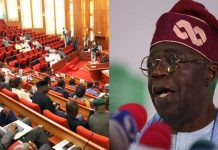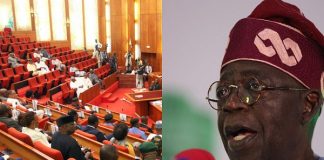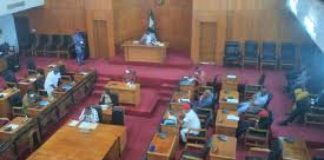🌿 Ruzu Non-Alcoholic Herbal Bitters
Ruzu Non-Alcoholic Herbal Bitters is a natural health supplement specially formulated to:
- ✅ Promote general wellness
- ✅ Detoxify the body
- ✅ Support the treatment of various ailments
Made from a powerful blend of 100% organic and medicinal herbs, Ruzu is completely alcohol-free, making it ideal for:
- 👪 All age groups
- 🌱 Health-conscious individuals
- 🌿 Anyone seeking non-alcoholic herbal remedies
Whether you're looking to boost your vitality, cleanse your system, or support healing the natural way, Ruzu Bitters offers a trusted herbal solution.
Human rights activists in Delta State have given the police a seven-hour ultimatum, requesting that journalist Fejiro Oliver, who has been detained since his arrest in Abuja on September 19, 2025, be released immediately.
Force Intelligence Department (FID) agents detained Oliver after they arrested him in Abuja and flew him to Asaba on suspicion of cybercrime.
They stated that he had to be released unconditionally, released right away, or arraigned in court to face the allegations the police allege they had against him. These were the three requirements that had to be fulfilled before the seven hours had passed.
At a press briefing in Asaba on Wednesday, the three—Barr. Omes Ogedegbe, Director of the General Confab for the Actualization of Human Rights; Comrade Dr. Akima Umukoro, President of UPU Youth Wing Worldwide; and Comr. Daniel Etaga, former President of the Niger Delta Youth Council (NDYC)—threatened that “difference to act will force them to pursue other legal and civil avenues to secure his freedom.”
His ongoing detention, they claimed, is not only illegal but also a glaring example of how the police are increasingly being used to further the personal agendas of influential people.
The unsettling trend of numerous petitions against Fejiro Oliver, which they see as a part of a concerted effort to stifle his journalism and activism, caused them to voice their concerns.
They say the most concerning thing is that the police officers who were supposed to look into these petitions now seem to be complaining themselves.
Instead of serving as impartial investigators, the police are allegedly confronting Fejiro about his earlier Facebook posts, which aren’t even connected to any official petition. This shows an unsettling pattern. It is stated that police personnel are looking for reasons to support his detention after the fact rather than looking into legitimate concerns.
Barr. Ogedegbe asserts that the police’s actions are egregious violations of the law and the constitution.
“It is required of law enforcement to conduct any investigation as unbiased umpires. However, it appears that the police have abandoned due process in this instance and are siding with one side, turning into tools of personal retaliation.
Fejiro Oliver, however, is unfazed by these attempts to weaken his will. The fact that the law is on his side and that public opinion is slowly shifting against the police’s harsh methods is what his supporters say gives him strength.
Fejiro’s arrest and the apparent plan to place him incommunicado are among the case’s most startling features. He was only given limited access to a select group of people because of the tremendous public reaction.
Serious concerns about what the police are concealing and who they are protecting were raised when they bemoaned the apparent lack of plans to put him before a court.
His supporters have raised a compelling query in response to this: Who is scared of Fejiro Oliver? Why is a journalist being silenced and isolated by the state apparatus rather than having any claims looked into in compliance with the law? If the accusations were true, why wasn’t he detained only after a full investigation?
The constitutional 24- to 48-hour timeframe for arraignment has long since passed. Since the police headquarters is only a short walk from the court, any delay is unacceptable. The police are unable to cite practical reasons for not arraigning him or releasing him on bond.
Comrade Akima, however, characterized Fejiro as a journalist who takes pride in his work as a “secret reporter,” which is another name for investigative journalism. “During this time, he spoke truth to power, and some people were offended by the level of information he was bringing to the public domain,” Comrade Akima said.
“Of course, to claim that he defamed their reputation, which is what they typically classify as online stalking or bullying. Today’s events are a manifestation of the accusations that have been leaking in.
“A number of people have been submitting petitions, and due to what we learned today, police officers who should be in charge of the case and look into the complaints as disclosed by their real complainants now appear to be the complainants themselves. This is creating an opportunity for even the police to falsify petitions.
None of these accusations are connected to any petitions, however Fejiro Oliver was questioned about a number of his Facebook posts. For me, this means that if there isn’t an ongoing petition in that respect, the police will simply visit his Facebook profile, gather information, and confront him with it. Although they are inundated with a number of petitions, we are starting to see that if the police, as required by law, wish to serve as umpires, they should appear to be looking into the claims made by the complainants. We’re not bothered, though.
But according to Etaga, Fejiro has been imprisoned in Delta State, igniting indignation over what detractors call a flagrant abuse of authority by Nigerian police and state actors.
Oliver remains imprisoned despite demands for his immediate release from civil society organizations and press freedom campaigners.
“The expansion of Nigeria’s civic space, abuse of executive power over law enforcement, and free expression have all been called into question by this development.
“The ongoing detention of Oliver highlights a concerning pattern in Delta State: the use of police as weapons against dissident voices. Unchecked, these authoritarian tendencies will weaken democracy, suppress journalists, and strengthen the culture of fear.
The question at hand is whether regular Nigerians still have the freedom to challenge authority without fear of incarceration; Fejiro Oliver is no longer at the center of this. In the first place, Fejiro was given permission to breathe air after our protests,” Etaga cautioned.
















